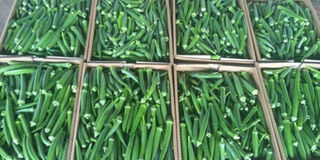Kanyije’s rallying call to make Uganda a ‘pepper country’

Kanyije’s okra packed in boxes for export. Below the farmer explains how he grows pepper in Busiika. Photos by Denis Bbosa
What you need to know:
- To James Kanyije, a season fruits and vegetable exporter with KK Foods Company, even before Ugandan think of reaping from the burgeoning oil industry, enough foreign exchange can be tapped from production of hot and chilli to satisfy the huge European demand. Seeds of Gold Magazine’s Denis Bbosa delves into the sudden crave for the crop at the expense of traditional exports like coffee.
Four years ago, James Kanyije’s KK Foods company fetched $210,000 (then about Shs530m) from the export of more than 40 tonnes of organic fresh pepper to Europe.
The demand has increased to the extent the farmer is contemplating extending his wings to Mwanza and satisfy the overwhelming market demand.
He has just signed a lucrative deal with Bahrain export Uganda pepper whilst the demand in Canada, Germany, France, Italy and England remains high.
The farmer also exports other horticulture plants such as eggplant, potatoes, avocado and okra.
“Pepper is the most lucrative and most wanted item in the European Union. To satisfy the market, I have encouraged my fellow farmers to bring their produce for export. So far I’m dealing with 10,000 farmers and calling on other pepper farmers to come and get to know who to grow and earn money,” Kanyije revealed.
“Our enterprises are short term and are crops that grow easily after rainy seasons. We export twice a week and we have signed a contract with farmers in Kyegegwa, trained them and we target working with five million farmers in the next five years,” he added.
Kanyije says Ugandan products are cherished in Europe because they are natural and reveals that pepper alone can generate about $1m (Shs3.6bn) a year.
“We now have a mega farm in Busiika where we have put a multi-million cold chain, a hub donated to us by Gen Salim Saleh (head operation wealth creation program) and all our farmers get farm inputs from us,” Kanyije told Seeds of Gold.
Born to be a farmer
Kanyije first touched a hoe aged three and joined school at 11 as he cherished tilting the garden in Mbarara District with dad and mum. He wants to see his income from horticulture exports souring to $30m or $40m in five years.
He subscribes to a view that if people are to grow to export, soon food exportation will be better than oil industry on the global the global market because consumption is increasing. In 2015, Kanyije exported 600 tonnes of pepper but sadly in 2017 it reduced to 400 tonnes due to pests.
At the moment, he has generated 150 tonnes at Busiika and 100 tonnes daily at Naalya but the demand is far from being met.
Targets Monitor Farm Clinic
“I would advise that seeds of gold farm clinic (set for May 26 in Mbarara) to partner with us (farming entrepreneurs and companies on ground. It is a good project that must be supported by agricultural experts like us to get hands on lessons,” he says.
Challenges
Apart from the pests and diseases that affect the quality of products they export, Kanyije is hindered by a cold chain transportation problem.
Cold chain is where the field heat is reduced to acceptable temperature before the crop goes bad from the farm to market.
He says, he has bought one truck with a cooler that transports the crops to Entebbe Airport.
The other challenge is limited capital for investment whereas the labour problem also crops up because many people are not willing to work pepper farmer.
Kanyije advises the Agriculture ministry to invest in indigenous farmers and entrepreneurs such as himself to sell Uganda abroad.
“In Europe now they know Uganda as a pepper producing country. Government investment in this pepper industry will increase jobs and foreign exchange to stabilize our currency,” Kanyije stressed.




